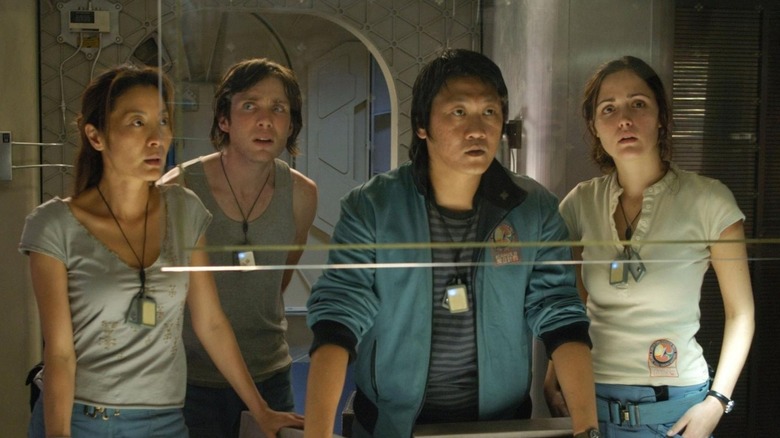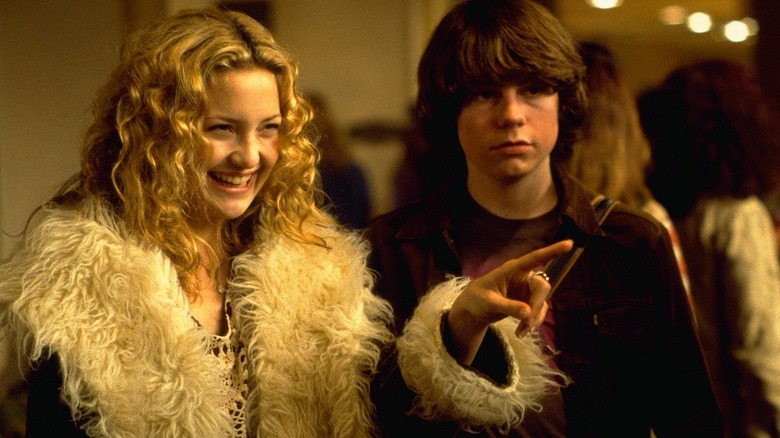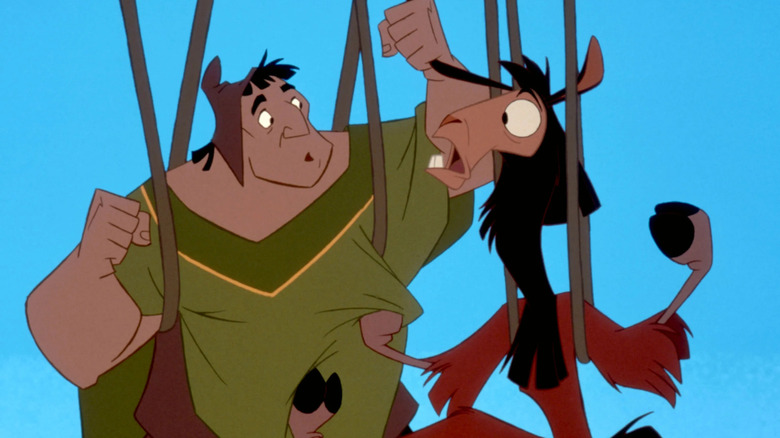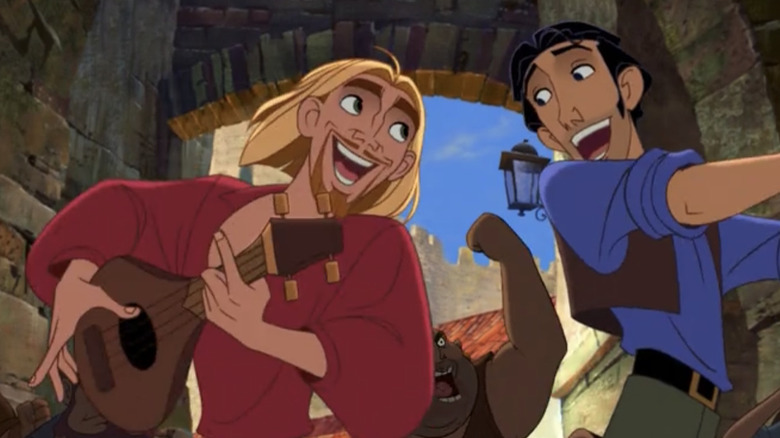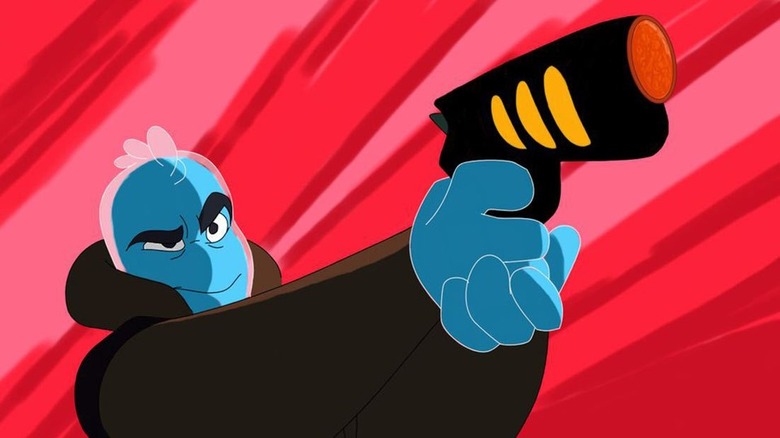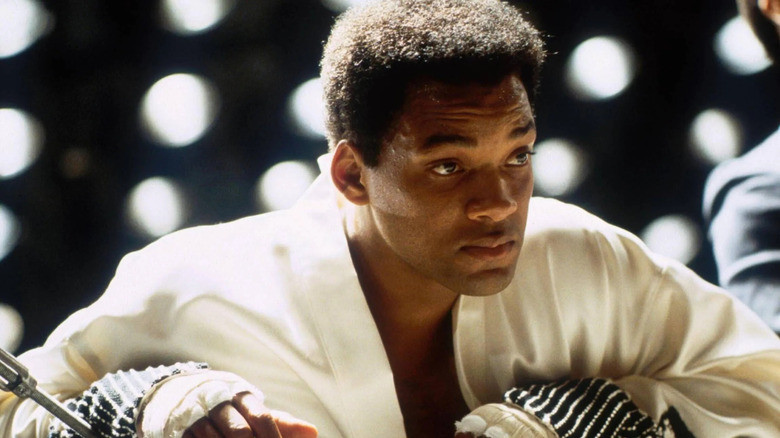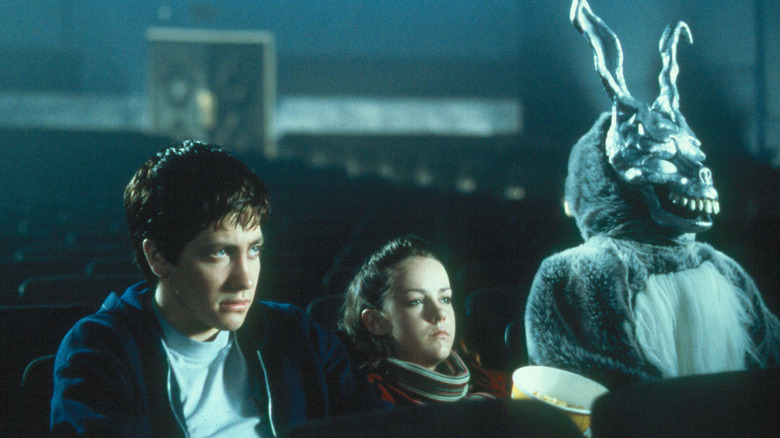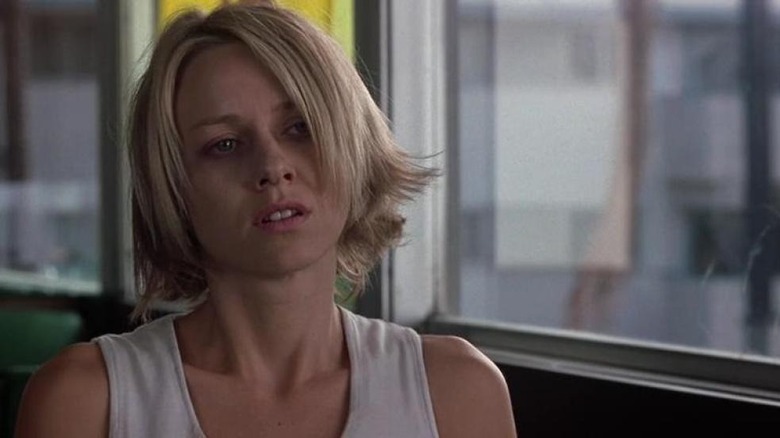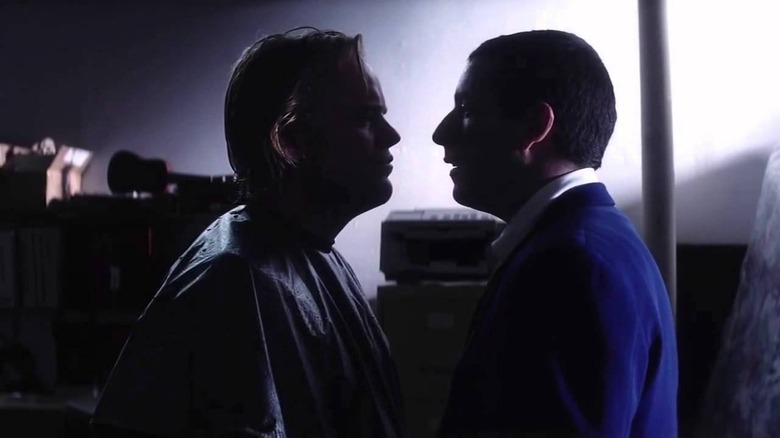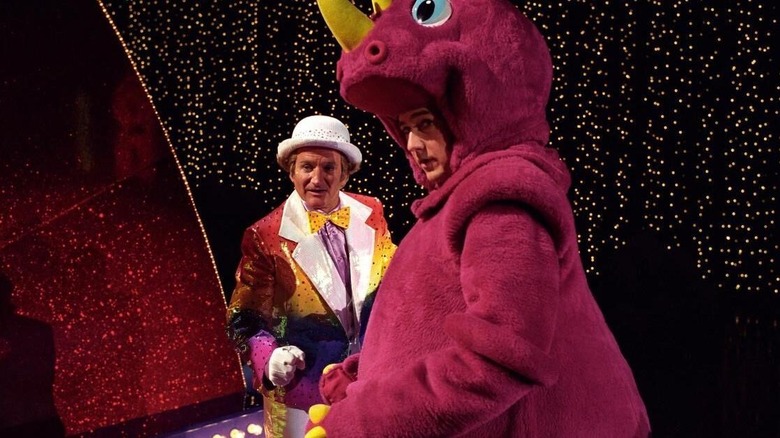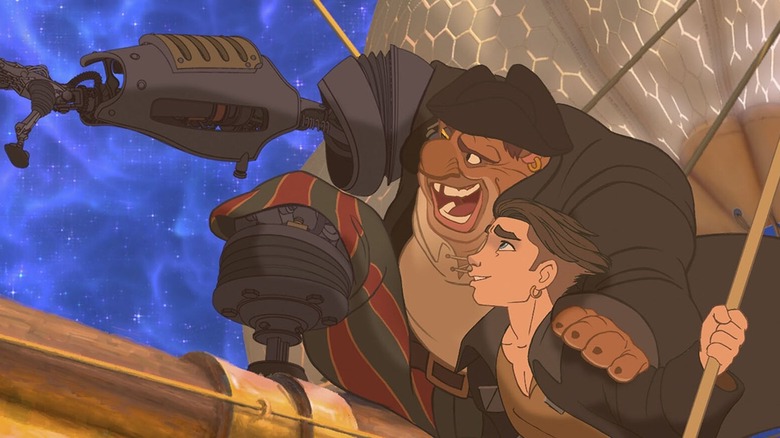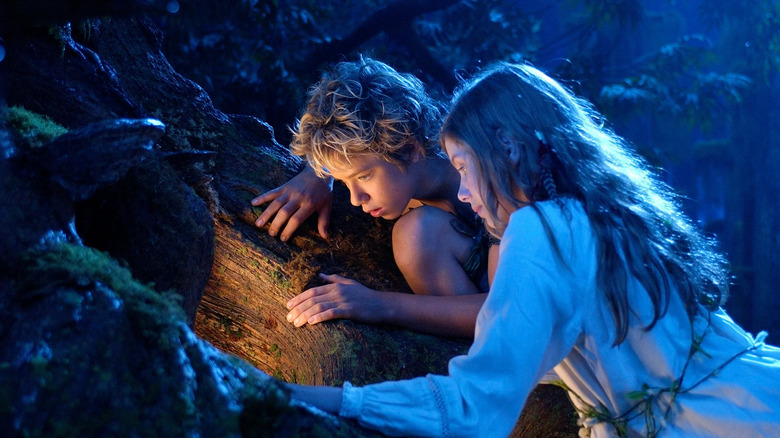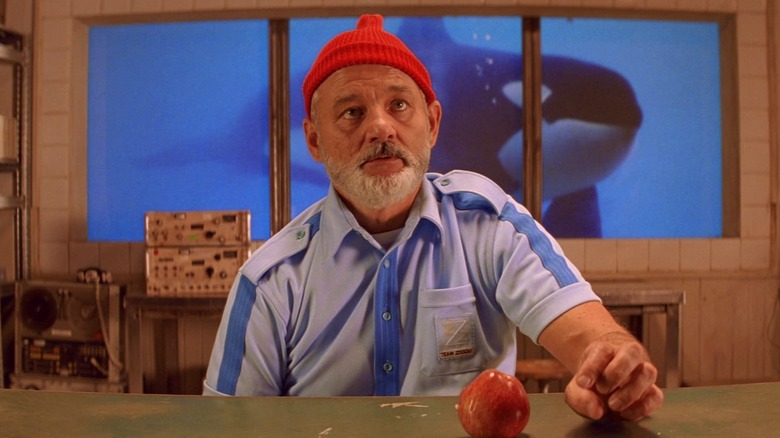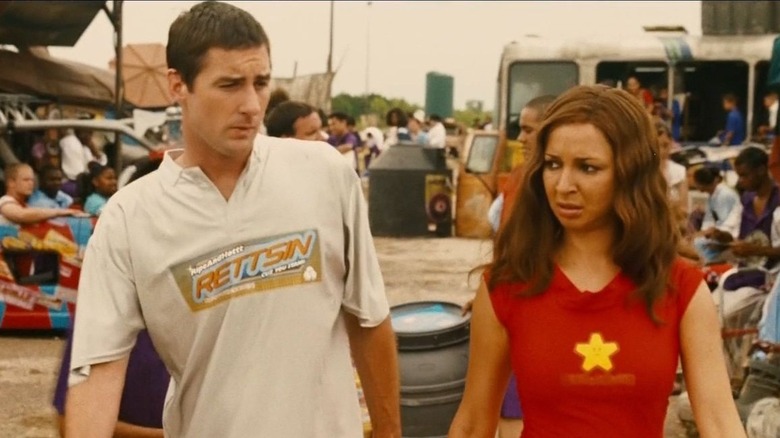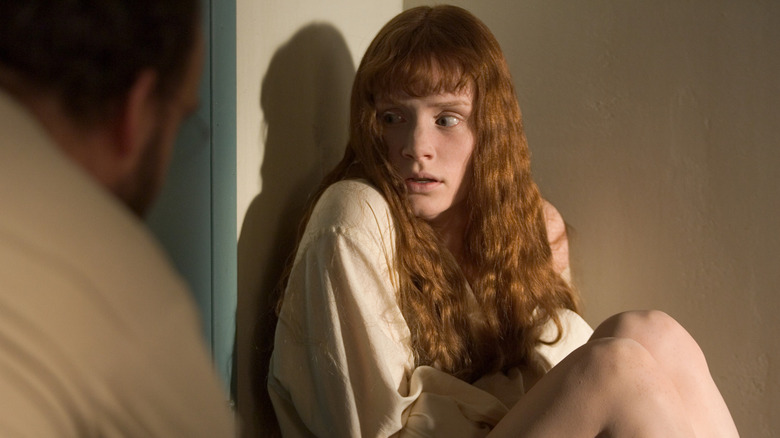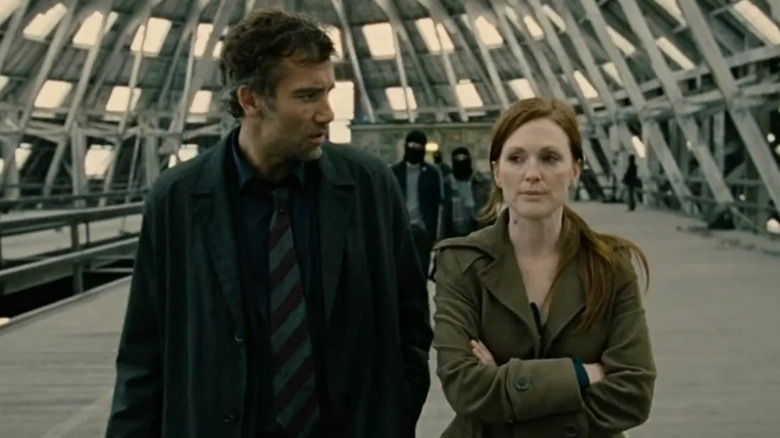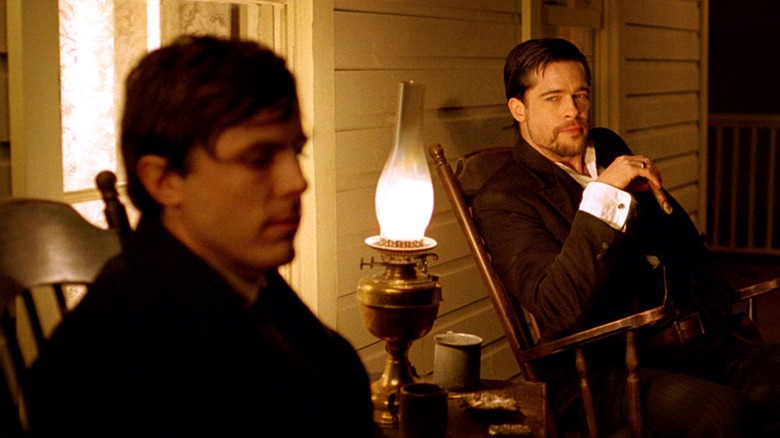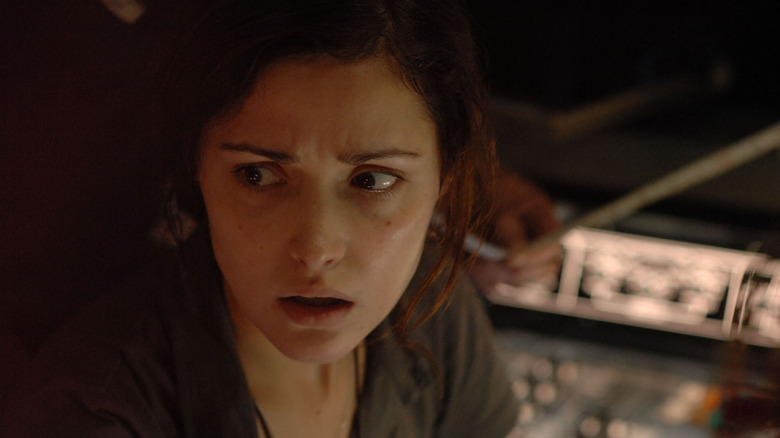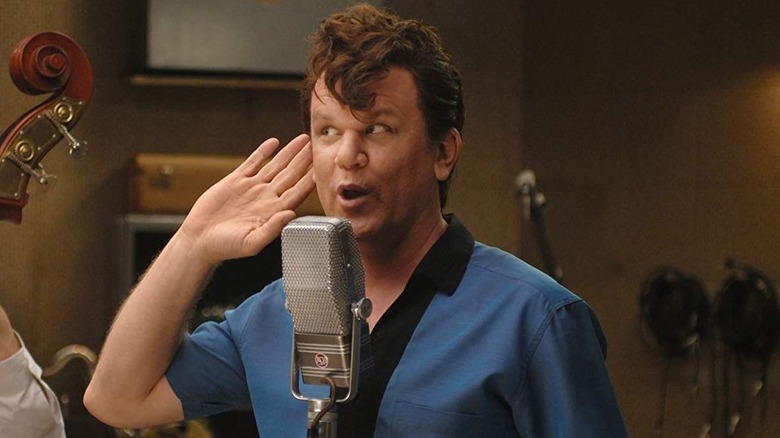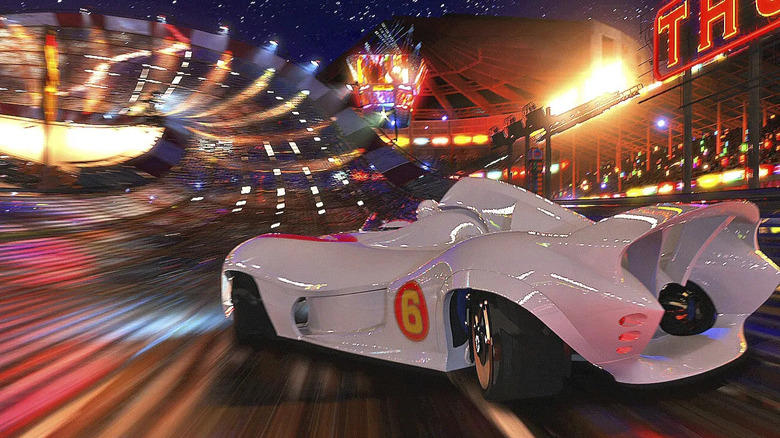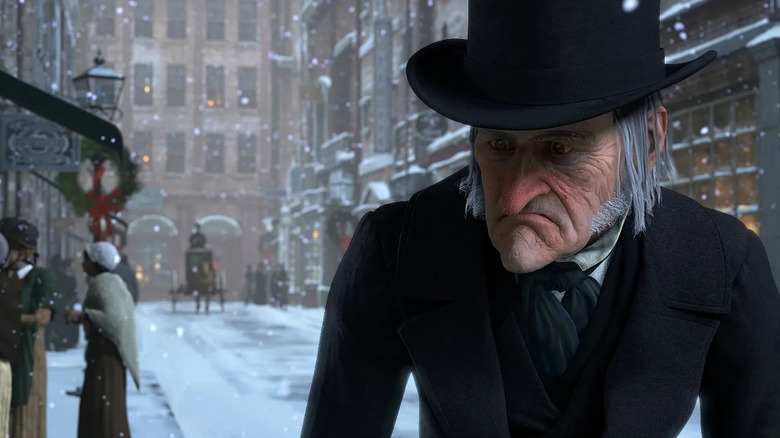2000s Box Office Bombs That Are Actually Worth Watching
Every year, movies are released that completely blow away audiences in movie theaters, resulting in a big payout for Hollywood studios at the box office. However, not every film that gets released has the privilege of becoming a blockbuster, despite some of them deserving success. This was especially true in the 2000s, prior to the integration of streaming services into the mainstream film industry, meaning that for a film to break even, it had to perform well during its theatrical run.
Sadly, this means that many films that underperformed ended up forgotten by most mainstream audiences, even though they might be better than some of the movies that actually did become blockbusters. For these films, no one person can be faulted for their failure to attract moviegoing audiences: Some just had poor release timing, while others might have been too ahead of their time.
Nevertheless, all 20 of these box office bombs from the 2000s deserve to be revisited by movie fans. While some of them showcase earlier work from actors who have particularly excelled in the 2020s, others are hidden diamonds in their respective actors' or directors' filmographies. From animated children's films to gritty science fiction, these box office bombs will make fans of cinema puzzled at why they performed so poorly.
Almost Famous
By 2023, "Almost Famous" has certainly seen a redemption in its public perception. The film was released in September 2000, but failed to meet box office expectations, resting at number 8 during its opening weekend. However, the film, which was written and directed by Cameron Crowe, was critically acclaimed, especially for the performances of actors like Kate Hudson, Frances McDormand, and Philip Seymour Hoffman.
Loosely based on Crowe's experiences as a teenage music journalist for Rolling Stone in the 1970s, "Almost Famous" follows the fictional rock band Stillwater, where a young journalist played by Patrick Fugit becomes acquainted with them and one of their groupies, Penny Lane (played by Hudson). In his review for the Chicago Sun-Times, critic Roger Ebert called "Almost Famous" "funny and touching in so many different ways." Ebert later designated the film as the best movie of 2000.
Although audiences at the time didn't turn up to see "Almost Famous" in theaters, the film saw success elsewhere. Crowe won an Academy Award for best original screenplay, as well as a Grammy for best compilation soundtrack album. The film even got a stage adaptation, which opened in 2019 and later made its Broadway debut in 2022. Despite how grounded it is in the 1970s rock and roll scene, it's a coming-of-age story that can speak to any generation.
The Emperor's New Groove
Disney's animated library was in a golden age during the late 1990s and early 2000s, with films like 1998's "Mulan" and 1999's "Tarzan" becoming huge box office successes. Sadly, not every animated Disney film became an immediate hit, with one example during this time being the 2000 film "The Emperor's New Groove." The film stars David Spade as young Emperor Kuzco, who becomes the target of an assassination attempt that goes awry and instead turns Kuzco into a llama.
After being released in theaters during the holidays in 2000, "The Emperor's New Groove" vastly underperformed compared to other Disney animated films at the time. At the box office, it grossed below new releases like "What Women Want" and "Dude, Where's My Car?," but the film eventually found later success and cult fame through its home video releases.
Sadly, the failure of "The Emperor's New Groove" in theaters was a long time coming, given its troubled production. The film was originally going to be an animated musical with songs composed by Sting, but poor test screenings forced Disney to bring in Mark Dindal to direct and restructure the film as a comedy. The 2002 documentary "The Sweatbox" takes a behind-the-scenes look at the film's difficult behind-the-scenes transformation.
The Road to El Dorado
Released the same year as "The Emperor's New Groove," "The Road to El Dorado" was an animated adventure movie from DreamWorks, predating their transition into 3D animation with 2001's blockbuster "Shrek." The film stars Kevin Kline and Kenneth Branagh as Tulio and Miguel, con artists who acquire a map to the mythical city of gold, El Dorado, where they are mistaken by its people for gods. It features music composed by Elton John and Tim Rice, who had previously worked together on Disney's "The Lion King."
Sadly, "The Road to El Dorado" didn't impress audiences when it was initially released. Reviews were mixed, with the Chicago Tribune calling it "fun to watch in ways that most recent cartoons aren't," while CNN said it "brings nothing new to the table of animation magic." The film was also criticized by indigenous organizations for its lack of respect for Mesoamerican history. Overall, its box office performance wasn't enough to dethrone a film like "Erin Brockovich," and continued to slip lower in the following weekends.
In more recent years, opinions have swayed regarding "The Road to El Dorado." Many moments from the film have become Internet memes, but the integrity of the movie hasn't been soured by these endless gifs. For most audience members in the Internet age, "The Road to El Dorado" remains an undiscovered gem from DreamWorks' 2D library.
Osmosis Jones
"Osmosis Jones," is one of the more unique animated films of the early 2000s. The film combines animation with live action, centering on Chris Rock's titular white blood cell, who works as an officer in the Frank Police Department, chasing down germs in the body of Frank, a live-action Rhode Island zookeeper played by Bill Murray. Osmosis Jones, or "Ozzy," particularly becomes faced with his greatest threat yet: a virus known as Thrax that could potentially kill Frank.
The box office performance of "Osmosis Jones" was nothing less than abysmal. With a budget of $70 million, "Osmosis Jones" grossed only $14 million during its theatrical run, failing to outperform critically panned films like "Jurassic Park III" and Tim Burton's "Planet of the Apes." It ended up being one of the last theatrical productions of Warner Bros. Feature Animation, before the company scaled back its animation feature staff and moved its focus to television.
Reviews for "Osmosis Jones" weren't kind, either. Particularly, critics weren't fond of the film's sense of humor, with TV Guide calling it, "A gross-out celebration of ... bodily fluids and functions that will delight kids of a certain age." The film did, however, receive a spin-off series, "Ozzy & Drix," on Kids' WB from 2002 to 2004, starring Phil LaMarr as Osmosis Jones. Despite poor reviews, it remains an interesting moment in the history of animated features.
Ali
"Ali" was a huge departure for Will Smith, who by the early 2000s was mostly known for his NBC sitcom "The Fresh Prince of Bel-Air," as well as blockbuster movies like "Bad Boys," "Men in Black," and "Independence Day." However, in Michael Mann's 2001 biopic, Smith portrayed professional boxer Muhammad Ali, chronicling his conversion to Islam and reclamation of the heavyweight champion title from George Foreman.
The film was a critical success, with The New York Times calling it "breathtaking — a near great movie," although some criticized the lack of justice done to its titular subject matter, considering the number of events it piles up in one film. The film's box office performance, sadly, was unlike Ali's own performances in the ring. "Ali" failed to gross its total budget, thanks to the success of its release weekend competitors, "The Lord of the Rings: The Fellowship of the Ring" and "Jimmy Neutron: Boy Genius."
However, the film remained one of Smith's most iconic and critically acclaimed roles. Despite losing the Academy Award for best actor to Denzel Washington's "Training Day" performance, Smith served as a pallbearer during the real-life Ali's funeral proceedings in 2016. Smith later went on to win a best actor Oscar for his portrayal of Richard Williams in "King Richard," though some still consider "Ali" to be the superior performance.
Donnie Darko
"Donnie Darko" is much more adored by the public in the modern day, though it was quite divisive and controversial with it was first released. Written and directed by Richard Kelly, the film stars a young Jake Gyllenhaal as the titular teenager, who becomes plagued with visions after a sleepwalking episode in which he learns that the planet will end in a month. It premiered in January 2001 at Sundance Film Festival, where it received reviews that made it a highly-anticipated indie film of 2001.
Unfortunately, its release in October 2001 was unlucky. Considering its advertising included scenes from the film involving an airplane crash, its release shortly after the September 11th terrorist attacks impacted audiences' interest in it. By the end of its original theatrical run, "Donnie Darko" only grossed a little under $518,000 against a budget of $6 million. The film has, however, since garnered a cult fanbase, and after reissues and a director's cut in 2004, the film ended up grossing over $7 million overall.
Although it flew under the radar when it was first released, "Donnie Darko" is now regarded as a quintessential psychological thriller of the early 2000s. To this day, fans of the film still debate the meaning of its ending, which can be perplexing, especially for those who watch the film for the very first time.
Mulholland Drive
"Mulholland Drive" is probably one of the most Lynchian films that director David Lynch has ever made. Released in 2001, the film's plot is hard to describe: Naomi Watts plays an idealistic young actress moving to Hollywood (or is she?), who befriends an amnesiac young woman played by Laura Harring. Several other interweaving subplots involve Justin Theroux as a director whose film is being controlled by the studio financing it, and Patrick Fischler as a man facing a recurring nightmare. However, as the movie progresses, the truth is a bit more complicated than any of this.
Although Lynch was an Academy Award-nominated director by the time "Mulholland Drive" was released, the film didn't shine at the box office, grossing less than $600,000 during its opening weekend and capping off its theatrical run with only $7.2 million at the domestic box office. However, to this day it remains one of Lynch's most critically acclaimed films (as well as one of his most divisive), with The New York Times deeming it "the grandest and silliest cinematic carnival to come along in quite some time."
Obviously, considering its importance to both Lynch's filmography and cinematic history, "Mulholland Drive" deserves a watch. However, to fully understand it, viewers might have to watch it a second, third, or fourth time, and even then they might still be befuddled by Lynch's intentions. But what's the fun of a David Lynch film without scratching your head?
Punch-Drunk Love
By the time 2002 rolled around, Paul Thomas Anderson was no stranger to commercial success, thanks to the acclaim of his 1997 ensemble drama "Boogie Nights," which he followed up with "Magnolia" two years later. His 2002 film, "Punch-Drunk Love," by all accounts, should've seen him reach even more success, given that he cast Adam Sandler in the lead, who at the time had recently starred in successful late 1990s blockbusters like "The Wedding Singer" and "Big Daddy."
"Punch-Drunk Love" stars Sandler as Barry, a man prone to fits of rage and violent outbursts due to his emotionally abusive family, which complicates his budding romance with Lena, played by Emily Watson. The film also features Philip Seymour Hoffman, a frequent collaborator of Anderson, as a mattress store owner and adult phone chat operator who threatens Barry after Sandler's character refuses to be extorted.
The film was a tonal departure from Sandler's previous work, garnering him acclaim and a Golden Globe nomination. However, at the box office, it didn't gross more than its $25 million budget, maxing out at number 7 total after three weeks in theaters. Still, it remained one of Sandler's most beloved dramatic performances, proving that the actor was capable of more than just slapstick comedy, and eventually opening the door for him to be in films such as 2019's "Uncut Gems."
Death to Smoochy
By the early 2000s, Robin Williams was quite an unpredictable talent in Hollywood. Though he had gained initial success through stand-up comedy and sitcom performances, he became notable for dramatic work in films like "Good Will Hunting," which won him an Oscar for best supporting actor, as well as "Dead Poets Society" and "One Hour Photo." However, one of the actor's biggest box office bombs of the early 2000s was the Danny DeVito-directed "Death to Smoochy."
In the film, Williams stars as Rainbow Randolph, a children's TV star who is fired for his criminal off-show behavior, and replaced with the naive and lovable Smoochy. Angered at being ousted from his job, Randolph opts to have the man underneath the Smoochy costume, played by Edward Norton, killed. What proceeds is a rather dark comedy of errors, though it's perhaps some of Williams' best tightrope walking between comedic acting and dramatic prowess.
Unfortunately, critics did not love the film, with Roger Ebert saying of it, "Only enormously talented people could have made 'Death to Smoochy.' Those with lesser gifts would have lacked the nerve to make a film so bad, so miscalculated, so lacking any connection with any possible audience." Meanwhile, The Village Voice praised both the film's humor as well as DeVito's direction. Its box office performance was nevertheless abysmal, grossing $8.3 million against a $50 million budget, but the film might still appeal to some modern audiences, if only for how absurd it is.
Treasure Planet
"Treasure Planet" is another hidden gem in Walt Disney's animated library, adapting Robert Louis Stevenson's 1883 novel "Treasure Island" into a fantasy science-fiction setting. As in the book, the film follows a young Jim Hawkins, who searches for the long-lost loot of the fabled pirate Captain Flint, teaming up with a ragtag group of pirates including their anthropomorphic captain Amelia, the cybernetic mutineer John Silver, and astronomer Dr. Delbert Doppler.
Though the film received acclaim from critics, who praised its quintessential Disney animated charm, "Treasure Planet" became one of the biggest box office bombs of all time. For starters, it was an expensive project for Disney, racking up a $140 million budget, of which it only earned back roughly $110 million. Its release over Thanksgiving weekend in 2002 was also overshadowed by the box office dominance of films like "Harry Potter and the Chamber of Secrets" and "The Santa Clause 2."
"Treasure Planet" was also the subject of internal dispute during its production at Disney. On top of that, it was a difficult film to appeal to Disney's usual audience due to its lack of music or romance. However, it remains an underrated masterpiece that every fan of Disney should sit down and watch, if only for the stunning visuals that were far ahead of their time.
Peter Pan
By 2003, there had been plenty of films made adapting the story of "Peter Pan," which originated as a play in 1904 by J.M. Barrie. The 2003 film adaptation, directed by P.J. Hogan, stars Jason Isaacs in dual roles as George Darling and Captain Hook, with Jeremy Sumpter as Peter Pan and Rachel Hurd-Wood as Wendy. The film follows the same story most people have heard a thousand times: Wendy and her younger brothers are taken by Peter Pan to the magical Neverland, where their encounters with Captain Hook show them both adventure as well as the importance of learning to grow up.
Despite the popularity of the story, Hogan's 2003 "Peter Pan" bombed at the box office, earning $122 million against their $130 million budget. However, "Peter Pan" had some tough competition in 2003, failing to outgross "The Lord of the Rings: Return of the King" on its second week of box office dominance, as well as competing holiday releases like "Cheaper by the Dozen" and "Cold Mountain."
Nevertheless, the film remains a charming adaptation of a classic children's book, with endearing performances and visuals that live up to the magic.
The Life Aquatic with Steve Zissou
Wes Anderson's movies haven't always been box office successes, with the exception of the Academy Award-nominated film "The Grand Budapest Hotel" in 2014. However, it was the director's fourth film in 2004, "The Life Aquatic with Steve Zissou," that failed to attract audiences the most. Co-written by Noah Baumbach, "The Life Aquatic with Steve Zissou" is a loose homage to the life of oceanographer Jacques Cousteau, starring Bill Murray as the titular diver who seeks revenge on a jaguar shark for killing his former partner.
Despite featuring an ensemble of some of Anderson's most frequent collaborators, including Owen Wilson, Cate Blanchett, and Jeff Goldblum, it grossed only half of its budget domestically after twelve weeks, totaling nearly $35 million internationally against a $50 million budget. Critical response was also divided, with some praising Anderson's unique visual and comedic style, while others found it off-putting.
In hindsight, reviewers have come around on "The Life Aquatic with Steve Zissou," with The A.V. Club re-evaluating it in 2014 after its re-release on The Criterion Collection, calling it "a comedy, albeit one with melancholy and morbid undertones." Though it's far from Wes Anderson's finest and most nuanced work, it remains an entertaining piece of the director's unique filmography.
Idiocracy
Mike Judge is best known for his work in television, from animated shows like "Beavis and Butt-Head" and "King of the Hill" to HBO's "Silicon Valley." However, Judge has also found success as a film director, particularly with the 1999 cult classic "Office Space," which disappointed at the box office but went on to find a second life through home video releases. Judge followed up "Office Space" in 2006 with "Idiocracy," centered on a dystopian future where corporations have allowed human intelligence to die out thanks to the advancement of technology.
"Idiocracy" didn't perform well at the box office, but this was no accident, thanks to the efforts of its distributor 20th Century Fox. Many decisions made during the film's promotional period seemed, in hindsight, meant to sabotage its success: Fox opted to not widely release the film, nor did they promote it through trailers or advertisements. The film wasn't even screened for critics, which led some to speculate that Fox was put off by the film targeting large corporations, such as 20th Century Fox's sister corporation Fox News (via The New York Times).
Suffice it to say, Judge's satire was on-point, and critics loved the film anyway. It's even more relevant today than it was when it was first released, and has even been referenced in post-2016 political activism against U.S. president Donald Trump, with fans of "Idiocracy" drawing comparisons between the president's campaign and the film's glimpse at the future.
Lady in the Water
M. Night Shyamalan can be quite a divisive filmmaker, as his films often incorporate mind-bending twist endings. Such examples include his 1999 thriller "The Sixth Sense," 2000's superhero film "Unbreakable," and, most recently, his 2023 horror film "Knock at the Cabin." However, his 2006 fantasy film "Lady in the Water" was both a critical and commercial failure, only grossing $72 million against a budget of $70 million.
"Lady in the Water" centers on an apartment superintendent played by Paul Giamatti, who discovers a sea nymph (Bryce Dallas Howard) living in the pool of his building. The film was heavily criticized at the time of its release, though critics' reactions may have been biased against the film. Particularly, Shyamalan casts himself as a tenant of the building who is writing a book that he believes will be world-changing, while Bob Balaban plays a misguided film critic who is brutally killed for his own errors.
For fans of Shyamalan's other work, however, "Lady in the Water" might still be worth a watch. It definitely has charming aspects to it, such as Giamatti's performance, but it's also far from the director's worst crimes against filmmaking.
Children of Men
Alfonso Cuarón has had a great run in the film industry, creating Academy Award-nominated films like 2013's sci-fi thriller "Gravity," as well as the 2018 drama "Roma," which won the Oscar for best foreign language film. Those two films, however, are far from Cuarón's earliest acclaimed works, as the director also created the 2006 film "Children of Men."
"Children of Men" takes place in the near future, where an infertility outbreak has left humanity scrambling to survive. Clive Owen plays an activist who is tasked with escorting a young pregnant refugee to safety across a war-torn America. The film was critically acclaimed upon release, with Dana Stevens at Slate calling it "the movie of the millennium because it's about our millennium, with its fractured, fearful politics and random bursts of violence and terror."
Despite its great reviews and showcasing of technical filmmaking prowess, it only grossed $70 million at the box office against a budget of $76 million, rendering it a box office bomb. It nevertheless has remained a favorite of science fiction lovers as well as filmmakers, with Bill Hader recently citing it as an inspiration for his directorial style in his HBO crime comedy "Barry."
The Assassination of Jesse James by the Coward Robert Ford
Andrew Dominik's 2007 historical drama is based on a 1983 novel by the same name, centering on the real-life relationship between American outlaws Jesse James and Robert Ford in the Wild West. "The Assassination of Jesse James by the Coward Robert Ford" starred Brad Pitt and Casey Affleck, with supporting performances from Sam Rockwell, Zooey Deschanel, and Mary-Louise Parker. The film was critically acclaimed by reviewers, with some calling it one of the best Western movies of the 2000s.
However, for some reason, "The Assassination of Jesse James by the Coward Robert Ford" did not fare well at the box office when it was released in September 2007. It only grossed $3.9 million domestically by the end of its theatrical run, mostly due to not being widely released alongside the year's box office successes like "Resident Evil: Extinction" and "Saw IV."
Somewhat unexpectedly, "The Assassination of Jesse James by the Coward Robert Ford" has developed a large cult following, resulting in a revival campaign to get it played at the Museum of the Moving Image in Queens, New York. It's also a favored project by Dominik, who called it "a movie that really benefits from being on the big screen," (via Collider). It's just a shame it wasn't appreciated by moviegoing audiences the first time around.
Sunshine
It's pretty amazing that a film with as stacked a cast as Danny Boyle's 2007 science fiction thriller "Sunshine" has gone unnoticed by modern-day audiences. The film, which centers on a spaceship crew attempting to jump-start the Sun before returning to Earth, features an ensemble that includes Cillian Murphy, Michelle Yeoh, Rose Byrne, Chris Evans, Benedict Wong, and Mark Strong. It's an early leading role for Murphy especially, who has recently seen acclaim in 2023 for his starring role in Christopher Nolan's "Oppenheimer."
Unfortunately, a film as ambitious as "Sunshine" did not fare well at the box office, with its international release grossing a measly $18.6 million across 44 countries. By the end of its theatrical run, factoring in its US and Canada numbers, "Sunshine" grossed $32 million total. This was even with the support of positive reviews, with some comparing it to Stanley Kubrick's "2001: A Space Odyssey" in terms of scale and visual spectacle.
The film does warrant a watch from any fan of science fiction films, if only for the incredibly stacked cast. Fans of the film also have a huge appreciation for the film's score, which was released in 2008 featuring the song "Adagio in D Minor," which has since been featured in trailers and television series that have nothing to do with "Sunshine," including "X-Men: Days of Future Past" and "No Time To Die."
Walk Hard: The Dewey Cox Story
2007 was a great time for both studio comedies as well as movie parodies, although this did not necessarily translate to box office success. One such example of this is "Walk Hard: The Dewey Cox Story," starring John C. Reilly as its titular rock and roll star, which parodies musical biopics like 2005's "Walk the Line." The film features many now-iconic moments from 2000s comedy movies, including one scene where Reilly's Cox meditates with the Beatles, played brilliantly by Jack Black, Paul Rudd, Justin Long, and Jason Schwartzman.
The film's satire of musical biopics and the overall state of the music industry in 2007 was adored by critics who saw the film back when it was released theatrically. In his review for the Chicago Sun-Times, Roger Ebert commended Reilly's performance, writing, "Instead of sending everything over the top at high energy, like 'Top Secret!' or 'Airplane!,' they allow Reilly to more or less actually play the character, so that, against all expectations, some scenes actually approach real sentiment."
Sadly, "Walk Hard: The Dewey Cox Story" didn't attract audiences when it was in theaters. It only grossed $20.6 million at the box office, underwhelming compared to its budget of $35 million. But by the time the film was included on Rolling Stone's 70 best comedies of the 21st century, it had garnered all the acclaim it had originally missed.
Speed Racer
The Wachowskis are some of the most accomplished filmmakers of the 2000s, thanks to their 1999 action film "The Matrix," which they have since followed up with three sequels, creating one of the most indelible science fiction franchises of the 21st century. The 2000s also saw the Wachowskis try their hand at adaptation, first with 2005's "V for Vendetta," then with 2008's "Speed Racer," based on the wildly popular Japanese manga and anime franchise, following a teenage race car driver.
A live-action "Speed Racer" film had been a long time coming before the Wachowskis were involved, finally coming to fruition in 2006 when the writer-director duo began working on the film with producer Joel Silver. The film also had an extensive marketing campaign from Warner Bros., that included Happy Meal toys, video games, and movie tie-in LEGO sets. Sadly, despite the hype surrounding the movie, it disappointed the studio with its box office returns, grossing $93.9 million against a budget of $120 million.
Reviews of "Speed Racer" at the time were also divisive, with some criticizing its narrative coherence, while others praised its visual effects and use of spectacle — common traits of the Wachowskis as filmmakers. Nowadays, many movie fans consider it an underrated classic, reminding those who were put off by the film that its heightened reality is part of what makes it so loyal to "Speed Racer" as a franchise.
A Christmas Carol
Like "Peter Pan," "A Christmas Carol" is a tale that's been told a hundred times by many different filmmakers. In 2009, Walt Disney Pictures released their third adaptation of the classic Charles Dickens novel after "Mickey's Christmas Carol" and "The Muppet Christmas Carol." This version of "A Christmas Carol" was directed by Robert Zemeckis, the visionary behind "Back to the Future" and "Forrest Gump," and starred Jim Carrey as Ebenezer Scrooge through the use of 3D motion capture.
However, these technological innovations ended up hurting the film in the long run at the box office. Though by the end of its international theatrical run, the film had grossed $325 million, topping its budget of $200 million, its initial performance was underwhelming, only grossing $30 million in the United States and Canada. Such a box office failure resulted in inner turmoil at Disney, with the president of Walt Disney Studios Motion Pictures Group subsequently resigning.
Nevertheless, 2009's "A Christmas Carol" remains a stellar adaptation of the classic Christmas tale, with Carrey's digitized performance bringing both nuance as well as humor.
